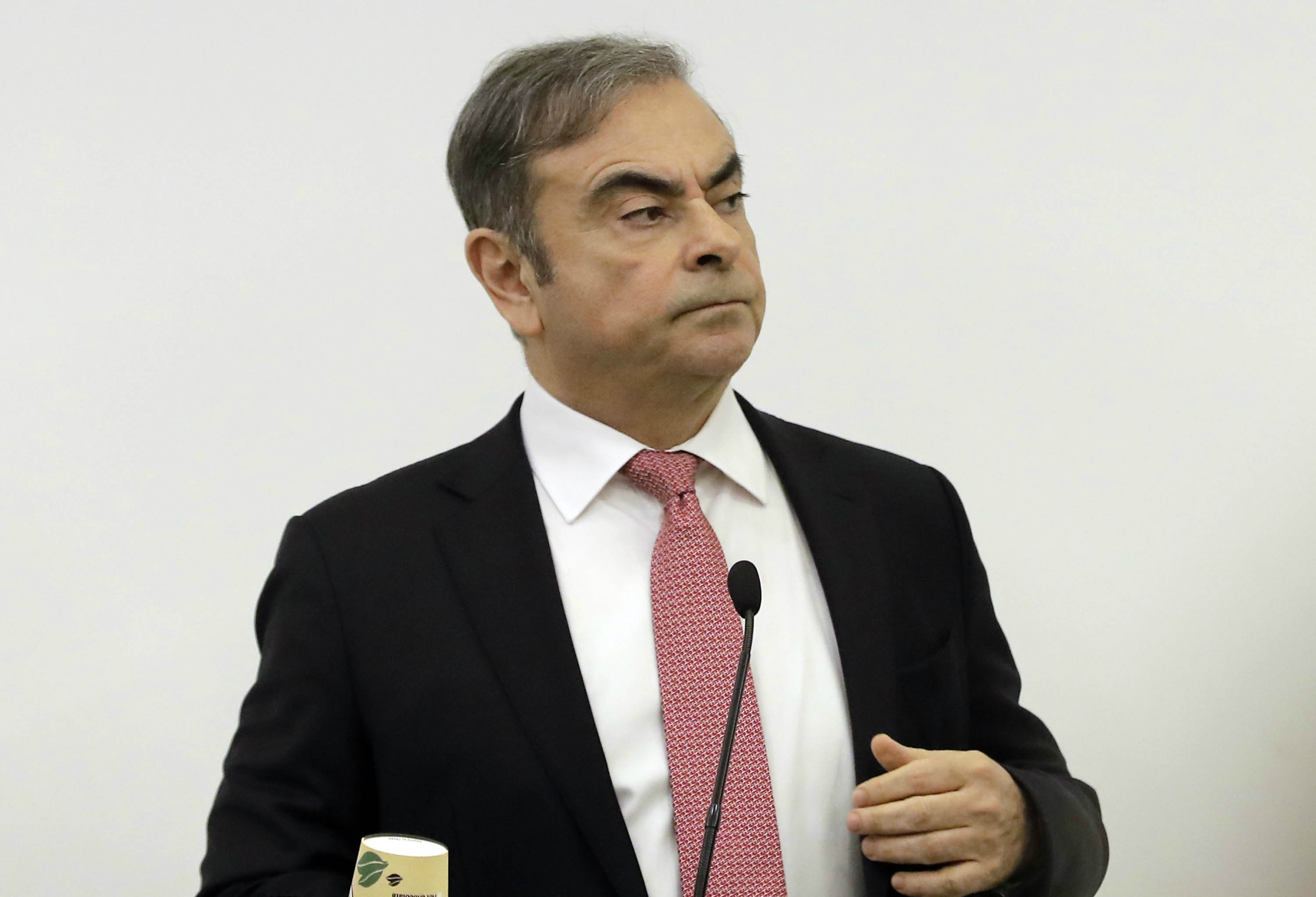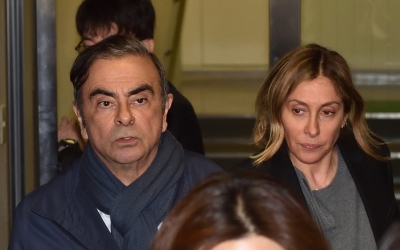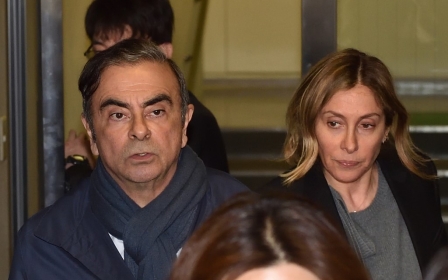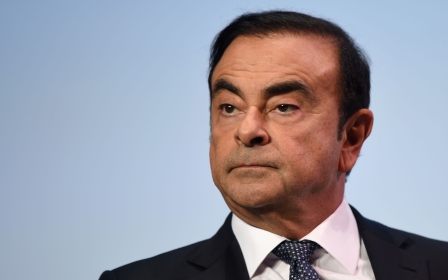'Proud to be Lebanese!' Ghosn makes first public remarks after escape from Japan

Fugitive ex-Nissan CEO Carlos Ghosn has broken his silence at a news conference in Beirut, following his dramatic escape from Japan at the turn of the new year.
"I'm today proud to be Lebanese," he said amid cheering from the audience, thanking the country for "standing with him" throughout this period.
"I'm not here to talk about how I managed to leave Japan... I'm interested in talking about why I left," he said.
Ghosn, 65, was arrested in November 2018, before being re-arrested the following month on suspicion of “aggravated breach of trust”.
He said on Wednesday that he had been treated brutally and ruthlessly by Japanese prosecutors, who threatened to take action against his family if he did not confess to their accusations.
Ghosn said his family was attacked by "relentless, baseless, shameless attacks orchestrated by Japanese prosecutors and Nissan executives".
He accused Nissan of conducting a "character assassination" against him which he said was "successful", citing a Bloomberg article which he said had reported that $200m had been spent on the smear campaign.
Ghosn said he had not spoken to his family for six weeks during his initial detention in solitary confinement in Japan, and could only communicate with them through his lawyer.
"The feeling of hopelessness was profound. And every day for over 130 days in detention, I fought for my innocence," he said.
Ghosn said he was detained in Japan under terrible conditions, deprived of prescribed medicine and subject to long hours of interrogation.
He added that nobody spoke in any of the four languages he speaks: English, French, Portuguese or Arabic.
"I thank the Lebanese authorities and citizens who never lost their faith in me," he added.
Ghosn said in the interest of not harming Lebanon's interests or its people, he would not name individuals from the Japanese government who played a role in "the plot" against him.
Asked if he would help Lebanon with its economic crisis, Ghosn said: "I'm not political and I don't have political ambitions... if an official asks for help, I will serve Lebanon, but not as an official or with a salary."
Ghosn refused to comment on whether he had met with Lebanon's President Michel Aoun after his return and whether he had been given the president's full endorsement, telling the reporter to ask the person in question (Aoun) about this.
'Gleeful venom'
Since his return, Ghosn’s only words had been to confirm his escape to Lebanon and that he would "no longer be held hostage by a rigged Japanese justice system where guilt is presumed, discrimination is rampant, and basic human rights are denied”.
Prosecutors allege that he under-reported his salary and diverted millions of dollars from the carmaker to cover potential personal trading losses.
He is also accused of transferring Nissan funds to a dealership in Oman and skimming off $5m for his personal use. Ghosn denies all the charges.
A relative of Ghosn's, who preferred to stay anonymous, declined to comment on specific details related to the businessman's legal situation. They did, however, condemn how the situation had become a major topic of discussion on Lebanese social media and the way Ghosn had been roundly mocked.
"I've just been disgusted at the way people on social media, who never met the man, felt free to pour gleeful venom and find pleasure in the destruction of a stranger's life," the relative told Middle East Eye.
Nissan investigation 'fundamentally flawed'
A statement Ghosn's defence team sent to some media outlets hours before the news conference blasted Nissan's own internal investigation into the allegations.
"The facts demonstrate that the investigation was never about finding the truth," the statement said, adding that it was carried out for the "predetermined purpose of taking down Carlos Ghosn".
The statement also said that the results of the investigation were never shared with Ghosn or the public.
"These are not the hallmarks of a company committed to conducting [a] fair and impartial investigation, rather evidence that Nissan’s investigation was fundamentally flawed, biased, and lacking in independence from its inception," it said.
Japanese media has criticised Ghosn for not inviting them to the news conference.
The Mainichi, one of Japan's major newspapers, issued a statement condemning Ghosn and his team and accusing them of not inviting Japanese media "to avoid being asked critical questions".
Japanese journalists and film crews have been sitting in the rain for days across the street from where Ghosn has been residing on Monot Street in Beirut's Achrafieh district.
Asked at the news conference why not all Japanese journalists had been invited, Ghosn said only those who could cover the case "objectively" were invited.
Red Notice alert
It is unclear how Ghosn, who holds French, Brazilian and Lebanese citizenship, was able to orchestrate his departure from Japan.
Japan’s Minister of Justice Masako Mori called Ghosn's escape “unjustifiable”, adding that the businessman “likely” left the country illegally.
Lebanon’s General Security service said in a statement following Ghosn's arrival that he had entered the country legally and that no measures need to be taken against him.
Lebanon and Japan do not have an extradition treaty, but an Interpol Red Notice has been sent to the Lebanese authorities by Tokyo for Ghosn.
On its website, the international law enforcement group defines a Red Notice as “an international wanted persons notice, but it is not an arrest warrant”.
On Tuesday, Japanese prosecutors issued an arrest warrant for Ghosn’s wife, Carole Ghosn, charging her with perjury.
Japan calls for Lebanese cooperation
Takeshi Okubo, Japan's ambassador to Lebanon, met on Tuesday with Aoun, caretaker minister and presidential advisor Salim Jreissati, and General Security chief Abbas Ibrahim at Baabda presidential palace.
In a statement from Aoun’s office, Okubo called for greater cooperation over the Ghosn case to avoid “negative repercussions” between the two countries.
Caretaker Justice Minister Albert Serhan has acknowledged receiving the Interpol Red Notice in a statement, but said he had not received the arrest warrant for Ghosn’s wife.
Citing the lack of an extradition treaty, Serhan added that Ghosn’s case would be handled by the Lebanese judiciary under local law.
Caretaker Foreign Minister Gebran Bassil told local television station Al Jadeed on Tuesday that it was not in Lebanon’s interest for relations with Japan to sour.
“Carlos Ghosn, simply, is a Lebanese who is successful abroad,” Bassil said.
“When he was arrested... we asked the Japanese authorities for a fair trial and for his conditions while detained to be acceptable and humane.”
Bassil added that Ghosn entered legally with a French passport and Lebanese ID, the latter which could be used to enter the country.
However, Bassil, who is leader of the Free Patriotic Movement party, said the judiciary should follow up on a legal complaint against Ghosn filed by three Lebanese lawyers over his trip and business deals in Israel in 2008 as Renault-Nissan chairman.
In response to his trip to Israel and the lawsuit, Ghosn said sarcastically on Wednesday that it was a "coincidence" that this was brought up after all these years.
"I didn't travel there as a Lebanese, but as general manager of Renault, as a French," he said. "I spoke to Lebanese officials about this and have been returning [to Lebanon] routinely since."
'Le Cost Killer'
Ghosn was known as "Le Cost Killer", and rose to hero status in Japan after playing a significant role in helping Nissan restructure its debt when the company was on the brink of collapse in 2001.
Renault had taken a stake of almost 40 percent in the Japanese company two years prior.
His success story was received with accolades across Japan to the extent that a comic book series of his life story was published in a biweekly publication.
Speaking about his arrest on Wednesday, he said: "This was not about justice... I was the hostage of a country that I have served for 17 years.
"I dedicated my professional life... I revived a company that nobody before me was able to do.
"More than 20 books of management were written about me," he said.
During Ghosn's remarks, Japan's justice minister announced a news conference would be held in response to the former businessman's statements.
Middle East Eye delivers independent and unrivalled coverage and analysis of the Middle East, North Africa and beyond. To learn more about republishing this content and the associated fees, please fill out this form. More about MEE can be found here.





